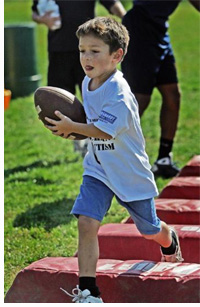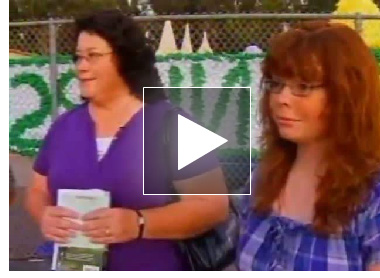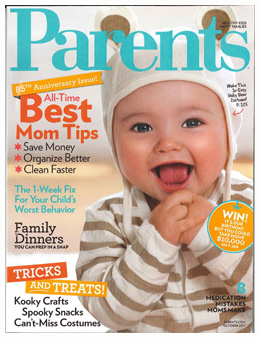High five, Hilltoppers!
by Bob Glowacki
 I am pleased to have Nicole Berlowski as a guest blogger today. Nicole is a senior therapist here at Easter Seals Southeast Wisconsin, supporting families and people living with autism.
I am pleased to have Nicole Berlowski as a guest blogger today. Nicole is a senior therapist here at Easter Seals Southeast Wisconsin, supporting families and people living with autism.
Kids with autism find heroes at football camp
by Nicole Berlowski, MS
Last weekend Easter Seals Southeast Wisconsin had the pleasure of teaming with the Marquette University High School (MUHS) Hilltoppers football team to offer a football camp for children with autism and their siblings. When a colleague and I first approached MUHS with the idea of integrating our participants into a camp with typically developing peers to help the children build relationships and form new heroes, the Hilltoppers embraced our vision.
we could have never in a million years imagined how incredible the event would be. Thank you to MUHS Head Coach Jeff Mazurczak and all the other MUHS coaches and players who were there for us last weekend. Not only did Coach Maz allow us to use the school’s field, but the Hilltoppers also supplied equipment and developed fun stations that supported the children’s needs. They even provided a photo booth for trying on uniforms!
Every drill at the camp was designed and run by members of the team’s coaching staff and demonstrated by members of the MUHS team. The players and coaches went above and beyond with the patience and encouragement they gave to every participant. Thanks to the Hilltoppers outstanding efforts and collaboration with Easter Seals, participants and their families had the joy of experiencing an afternoon of football fun that will not be forgotten.
It’s difficult for me to put into words how amazing it was to see the children running around with smiles on their faces and footballs in their arms. The football camp truly was a great example of Easter Seals fulfilling their mission to support integrating children with autism into the community. Feedback from the camp indicates the respect other parents and coaches have for the autism community. My hope is for Easter Seals and the community to continue to develop opportunities for these children to be supported in the natural environment.
You can visit our photo gallery to see what fun we all had at football camp last weekend. Who could resist watching a bunch of children tackling others or running up to you for a high five??








 When Apple unveiled the Macintosh way back in 1984, they promoted it as “the computer for the rest of us.” Computers before then had been designed with high-tech geeks in mind, but Steve Jobs was a visionary. He understood that everyone could benefit from the technology.
When Apple unveiled the Macintosh way back in 1984, they promoted it as “the computer for the rest of us.” Computers before then had been designed with high-tech geeks in mind, but Steve Jobs was a visionary. He understood that everyone could benefit from the technology. October’s issue of Parents Magazine features Easter Seals in a five-page article called Understanding Autism. The article is about Easter Seals Make the First Five Count — our new awareness and advocacy effort designed to give children with or at risk of autism, developmental delays or disabilities the right support they need to be school-ready and build a foundation for a lifetime of learning.
October’s issue of Parents Magazine features Easter Seals in a five-page article called Understanding Autism. The article is about Easter Seals Make the First Five Count — our new awareness and advocacy effort designed to give children with or at risk of autism, developmental delays or disabilities the right support they need to be school-ready and build a foundation for a lifetime of learning.